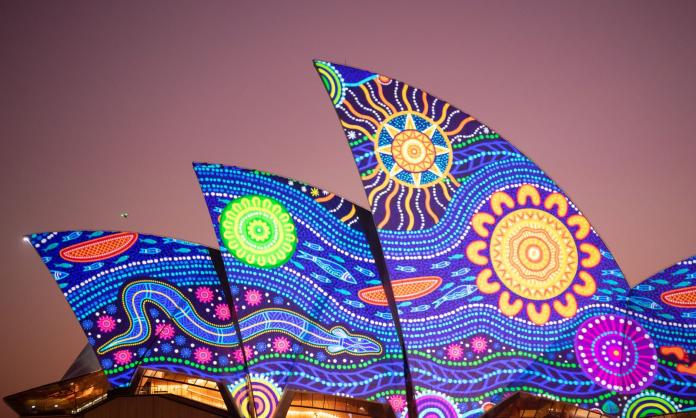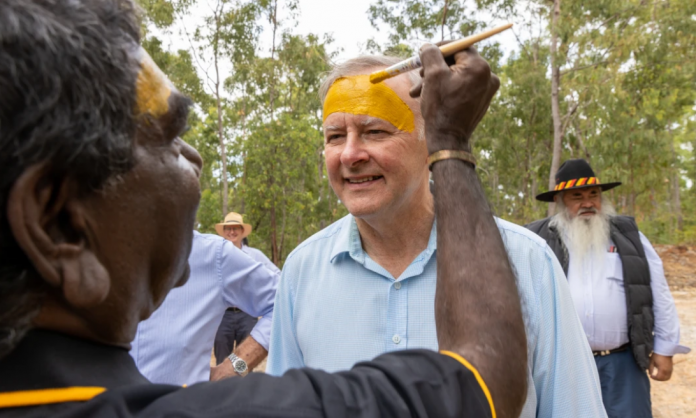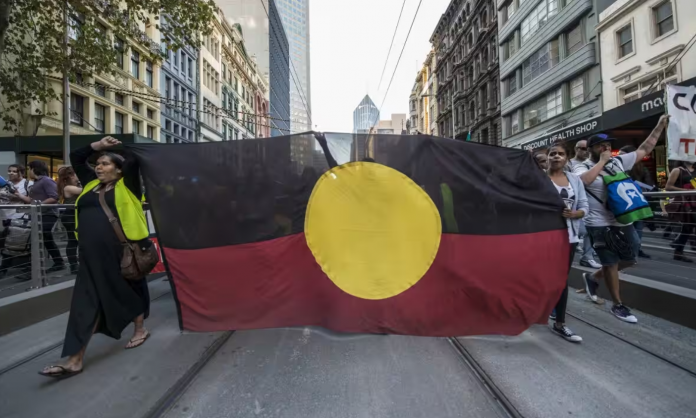In 2021 Western Australian mining conglomerate Mineral Resources Limited (MRL) celebrated the launch of its new Waalitj Centre, a large warehouse in the iron ore-mining township of Koolyanobbing built to store and manage the company’s equipment. The warehouse’s exterior, the company writes, “showcases an impressive mural representing our relationship and respect for Traditional Owners on the lands on which we operate. Commissioned by respected local Aboriginal artist, Aaron Hayden, the artwork draws inspiration from his experience of the Yilgarn region and represents MRL’s ongoing relationships with the local Njaki Njaki people”.
MRL boasts that the Waalitj Centre reflects the company’s focus on “continuous improvement, innovative thinking and working smarter to become more productive every day”. No doubt the mural gives MRL executives a warm feeling on visits to its giant and highly lucrative iron ore mine nearby. How many of the Njaki Njaki people themselves would share that feeling is unclear.
It’s not just mining companies like MRL that are keen to promote their supposed respect for Aboriginal culture. Whether it’s commissioning artworks, publicising their support for the Indigenous Voice to parliament, or promoting Indigenous spokespeople and welcome to countries, much of corporate Australia is keen to foreground its supposed anti-racist credentials.
This, however, is a facade. To the extent that companies want to present themselves this way, it’s so that they can better exploit people and natural resources. MRL’s Koolyanobbing mine is estimated to contain up to 40.8 million tonnes of iron ore, currently worth more than $8.4 billion. The traditional owners of the land these mines are on, apparently so admired by company management, can expect to see only a tiny fraction of this revenue. It’s a similar picture elsewhere in Australia, where mining companies are enjoying massive profits from high commodity prices while the majority of traditional owners live in poverty. A few murals and a cultural centre here and there are a small price to pay to gain the political licence for such a windfall.
Mining giant Rio Tinto is another example. The company’s action plan for working with Aboriginal people says “we recognise the cultural, spiritual, and physical connections that Indigenous people have with land, water, plants, and animals”. But in 2020, the company blew up sacred rock shelters at Juukan Gorge to make way for an iron-ore mine. As historian Clare Wright put it, “In a matter of minutes, eight million tonnes of ore were ripped from the earth, and with them, 46,000 years of cultural heritage destroyed ... For this hefty price we all paid, Rio Tinto lawfully gained access to $135 million of high-grade iron ore”.
Respect for Indigenous culture takes a back seat as soon as it bumps up against the pursuit of profit.
The 2023 campaign by Western Australian business organisations against the state’s Aboriginal Cultural Heritage Act (ACHA) further illustrates the point. While very moderate, the ACHA was seen by the Pastoral and Graziers Association of WA as a threat to its members’ future profits. The mining industry was similarly concerned. Warren Pearce, chief executive of the Association of Mining and Exploration Companies (AMEC), complained that under the ACHA mining projects would be “slowed down substantially”. In a meeting of AMEC, mining executives argued that the ACHA would restrict mining companies from obtaining critical materials, metals and iron ore.
Western Australia’s Labor government ultimately gave in to the pressure, and the ACHA was repealed. This victory of corporate interests against a real (though very limited) example of Indigenous empowerment didn’t stop them, though, from continuing to boast of their commitment to “Indigenous empowerment” in the abstract, non-actionable sense. AMEC head Pearce was back at it in December, describing the organisation’s awards night as an opportunity “to showcase the [mining] industry’s commitment to exploration, diversity and inclusion, the environment, [and] First Nations empowerment”.
Corporate Australia’s determination to undermine any attempt to grant Indigenous people control over land is just one part of the picture. Just as important is big business opposition to measures that would help reduce poverty and expand public services, like higher wages, better working conditions, more funding for public health and housing. It’s these measures that, in the short term, would have the most significant impact on the lives of Indigenous people—yet big business consistently uses its clout to argue against them. The policies they favour, such as privatisation, tax cuts for corporations and the rich, and greater “flexibility” and “wage restraint” for workers make it harder for Indigenous people to get ahead.
Indigenous poverty is both a product and a cause of racism. The entrenched racism of Australian society helps justify the lack of serious government action to improve conditions for Aboriginal people. And the conditions of poverty in which many Aboriginal people live are used, in turn, to reinforce racist stereotypes and justify racist policing and sky-high levels of incarceration.
Politicians and right-wing ideologues can then point their finger at Indigenous people to show why individual responsibility, rather than social support, is key to improving living standards. Once this is established, it’s an easy slide to apply the same logic to everyone, with all the cuts, privatisation and punitive social measures that go with it. For corporate Australia, this means less of their profits going to wages, public services and welfare via taxes, freeing up more public money to be spent on infrastructure for industry, corporate subsidies and tax cuts.
None of this can be somehow made right by a bit of funding for cultural centres, regular acknowledgements of country, and other corporate displays of respect for Indigenous people. If we’re to achieve genuine liberation for Indigenous people, we need to see through their attempts at “blackwashing” and abolish capitalism and its racist institutions for good.










